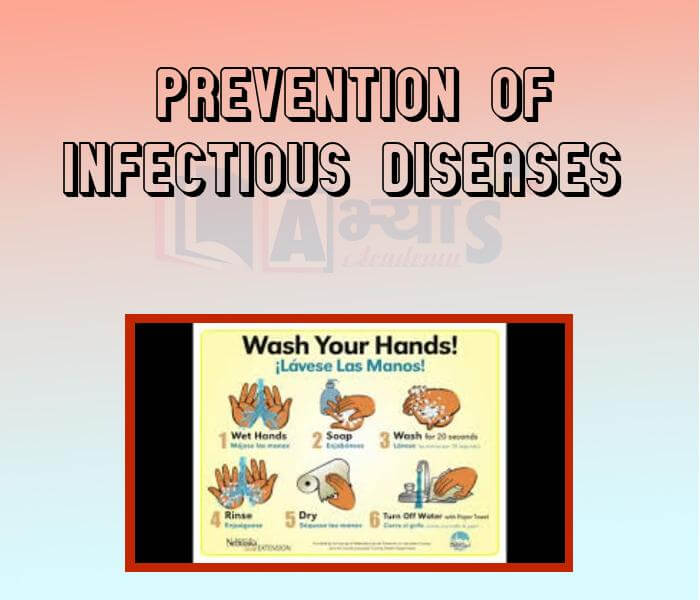Prevention of Infectious Diseases





Prevention of Infectious Diseases
Specific Prevention of Infectious Diseases: Specific prevention is provided by the immune system when it produces some specific molecules called antibodies to fight against specific invading microbes or their products, called antigens. Antibodies are proteins made by the white blood cells, called lymphocytes, in response to any foreign substances, called antigens, in order to detect them, bind with them and destroy them. Antigens are of many types. For each type of antigen, the body produces a corresponding antibody to bind with it and destroy it. The antigen - antibody binding is highly specific. An antibody binds with an antigen to destroy it in the following ways:
The immune system has a memory of the invading microbes. It recognizes them and fights them later if they invade again. When an infectious agent invades for the first time, the antibodies are produced slowly.
After destroying the antigens, they remain in the body. When there is a second infection, the circulating antibodies recognize the specific antigens and more antibodies are produced much faster this time. When we suffer from a mild form of a disease, our immune system forms antibodies against the invading antigens. At the second infection of that disease, the immune system responds faster to destroy the antigens as there are antibodies that already recognize them. As a result, we do not suffer from the severe form of the disease. For example, if we have had mild chickenpox once, we will not suffer from its severe form later.
This memory of our immune system help us to get immuned by the process of vaccination. Vaccines contain a microorganism or virus in a weekened,live or killed state, or proteins or toxins from the organism.In stimulating the body's adaptive immunity, they help prevent sickness from infectious diseases.
Louis pasteur is responsible for which of the following reforms ? | |||
| Right Option : B | |||
| View Explanation | |||
Sterilisation of clothes of chicken pox patients prevents spreading of the disease because it can ___________. | |||
| Right Option : C | |||
| View Explanation | |||
Against which of the following is vaccination not available _______________. | |||
| Right Option : C | |||
| View Explanation | |||
Students / Parents Reviews [10]
My experience with Abhyas academy is very good. I did not think that my every subject coming here will be so strong. The main thing is that the online tests had made me learn here more things.

Hiya Gupta
8thIt has a great methodology. Students here can get analysis to their test quickly.We can learn easily through PPTs and the testing methods are good. We know that where we have to practice

Barkha Arora
10thIt was good as the experience because as we had come here we had been improved in a such envirnment created here.Extra is taught which is beneficial for future.

Eshan Arora
8thIt was a good experience with Abhyas Academy. I even faced problems in starting but slowly and steadily overcomed. Especially reasoning classes helped me a lot.

Cheshta
10thMy experience was very good with Abhyas academy. I am studying here from 6th class and I am satisfied by its results in my life. I improved a lot here ahead of school syllabus.

Ayan Ghosh
8thOne of the best institutes to develope a child interest in studies.Provides SST and English knowledge also unlike other institutes. Teachers are co operative and friendly online tests andPPT develope practical knowledge also.

Aman Kumar Shrivastava
10thAbout Abhyas metholodology the teachers are very nice and hardworking toward students.The Centre Head Mrs Anu Sethi is also a brilliant teacher.Abhyas has taught me how to overcome problems and has always taken my doubts and suppoeted me.

Shreya Shrivastava
8thI have spent a wonderful time in Abhyas academy. It has made my reasoning more apt, English more stronger and Maths an interesting subject for me. It has given me a habbit of self studying

Yatharthi Sharma
10thAbhyas is a complete education Institute. Here extreme care is taken by teacher with the help of regular exam. Extra classes also conducted by the institute, if the student is weak.

Om Umang
10thBeing a parent, I saw my daughter improvement in her studies by seeing a good result in all day to day compititive exam TMO, NSO, IEO etc and as well as studies. I have got a fruitful result from my daughter.
